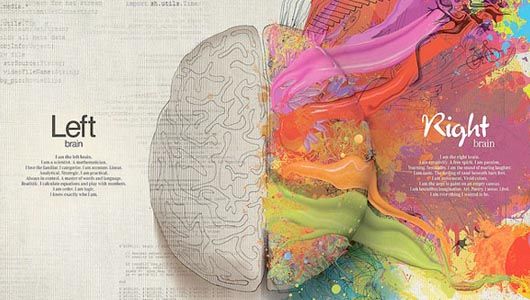Free Play: The Social, Cognitive & Emotional Pay Offs of Allowing Whimsicality

Throughout human existence the study of science and history has stifled the natural human aversion to accepted, uneducated assumption and stereotype. For example, over time it has been falsely believed humans only use 10 percent of their brain. When in actuality humans utilize nearly every neurological pathway available to them in the perception, processing and storage of memories, information and overall compiled data of daily life and study. It has been ignorantly spewed that people are either ‘left brained’ or ‘right brained’ dominated by one or the other in both temperament and orientation. This misconception lies in that all things analytical and all things creative rest in separate, opposite lobes of the brain, though in reality brain function works in a synthesized operation throughout the entire organ. Long ago, it was even once taught that the earth was the center of the entire universe. From Marie Antoinette’s ‘let them eat cake’ to Julius Caesar’s “Et tu, Brute?”, along with various formulated lies of history, these are fueled by the natural human impulse to agree with the multitude. Other accepted truth such as a constant, structured curriculum for growing children remains the best way to teach them; this is just another sociological fallacy facilitated by our culture and times, and in retrospect this may be severely detrimental to the education and molding of young minds. In truth, recent data and contemporary studies are showing “free play” and unorganized versions of imaginative play have undeniable, superior effects on the brain than the inflexible, past championed philosophy of a strictly organized learning construct.
“Free play” is a rising idea in child care and may be the answer to solving problems affiliated with social, cognitive and emotional development of kids. In a clinical report issued by the American Academy of Pediatrics and the Committee on Psychological Aspects of Child and Family Health, the entire memo was dedicated to the importance of child play. Such play lets kids apply their innovativeness while expanding adeptness, group involvement, neurological pathways and temperamental adaptiveness. Play is significant to a blooming brain evolvement. It is by means of free play young kids communicate with the world they’ve created. This prompts them to generate a reality they govern, vanquishing anxiety and rehearsing grown up responsibilities. While children interact in their fantasy, these creative delusions support advanced capabilities, and foster strengths needed in order to combat trying times that lie ahead in adulthood. Unstructured play urges a child to accept communal reliability, and a general understanding for peaceful conflict resolution. (Ginsburg) Play gives kids the much needed excuse and specified time to expand emotions and build upon skills needed as they progress through life. Without this creative outlet it may enable a fundamentally rigid social script that does not stimulate growth and learning; nor does it nurture cognitive competency or emotional mobility. Neurologically speaking, these behaviors are in their highest malleable stages throughout the beginnings childhood and should be given the amount of thorough analysis and positive care it undoubtedly deserves.
With an absence of play and excess of stress, this can predispose kindergarten age children to social and mental instabilities that may take form in their adolescent progression. Suicide rates have increased almost four times over for teens since the mid 1900s and more kids are being exposed to high degrees of social stress. Anything from the rising advocation of lofty performance on standardized testing, to the heightened amount of extra curricular activities, this is dramatically effecting the cortisol levels in young people. So much so, that in a recent poll to the average American seventh grader, when inquired “Am I happy with my life?”, only a staggering 36 percent answered ‘yes’. (Pelliserier) This perpetuates a dangerously high, stress-filled profile for young kids and begs the question as to whether or not this micromanaged approach in education and daily life is optimal for a child’s social development.
On the same note, this damaging over-structured ideology can also effect the cognitive abilities of kids. Sergio Pellis, a researcher employed by the University of Lethbridge and advocator of play says, “The experience of play changes the connections of the neurons at the front end of your brain…And without play experience, those neurons aren’t changed”. Those microscopic evolutions present in the prefrontal cortex throughout the course of maturation cultivate the brain’s executive control center. Pellis adds, that this plays a vital part in cognitive functionality. (Hamilton) This neurological arousal helps with attention span, learning proficency, and higher tiers of intellectual thought. Yet play is ironically cast aside as unneeded and frivolous in comparison to disciplined modules. This connects back to the original, introductory idea that people, throughout the course of time, have been mislead by previously accepted notions of historical or scientific conclusion. This misinterpretation has created perilous consequences directly contingent to wrongful logic it was first based upon.
As for the emotional benefits of free play, their imaginative fun can actually abet emotional efficacy and overall psychological health. Children, of elementary school years, polish emotive control in their imagination inspired realms. The child usually engages in emotionally-inflamed circumstance, embracing subjects that may evoke angst, enmity, or grief. This has all been meticulously documented by a respected researcher and well renowned textbook author by the name of Gisela Wegener-Spöhring. For instance, she observed several play contexts in which a group of small girls made believe that they were orphaned sisters who’d been abandoned by all family and stranded in a thick wooded area along with bears and terrifying obstacles. To manage both their pretend sadness and horror, the girls often hugged and chatted lovingly; even constructing a home with fake appliances and weapons, in a simulated cave, to protect them from the beasts of their formulated wilderness. (Gray) This intense emotional play conclusively required imaginative and emotional resiliency in which the child was urged to take on. The participation in such practical solutions to their mock anxiety builds the ability to combat an inherent functional fixedness of the human tendency, and enriches a child’s emotional acclimation to a variety of poignant environments.
So how can one fight off this infinite struggle between teaching a child in a structured climate yet allowing them the freedom to develop in a healthy and creative fashion? Surprisingly enough, there is a two word answer: FREE PLAY. If the statistics and studies were insufficient, how about the continued guidance for pediatric care to emphasize to parents that engaging in free play along with your child can strengthen lifelong bonds and nurturing attitudes? Children will be more likely to succeed along with dealing with the failures of life appropriately. It is also made clear by these pediatric guidelines that the necessary characteristics for children to thrive are not grown from academic performance or extracurricular obligations, but born in the secure bond of parental love and inventive creativity formed in childhood. (Ginsburg)
History will always preserve the falsities of previously believed principles, but hopefully with the drive to overcome these once untold effects of creative free play on the human mind, these educational approaches can be reasoned through and set to help the generations of children to be born and develop healthily long after this era has past.
Work Cited
Ginsburg, Kenneth. “The Importance of Play in Promoting Healthy Child Development and Maintaining Strong Parent-Child Bonds.”. American Academy of Pediatrics, 2007. Web. 10 May 2015.
Gray, Peter. “Free Play Is Essential for Normal Emotional Development.” Psychology Today. Freedom to Learn, 21 June 2012. Web. 14 May 2015.
Hamilton, Jon. “Scientists Say Child’s Play Helps Build A Better Brain.” NPR. NPR News, 6 Aug. 2014. Web. 7 May 2015.
Pellisier, Hank. “Stress and Your Child’s Brain.” GreatSchools. Health&Behavior, 2013. Web. 11 May 2015.
What do you think? Leave a comment.











I consider Free Play a way for children to create their own learning experiences. I set up the environment and simply facilitate their learning. This means I pay attention to what works, what doesn’t…
Interesting analysis. Thanks for sharing!
Thanks for reading, glad you liked it!
While I believe that the major text points at useful aspects of education, the introductory paragraph should be rephrased. The current structure in that 1st paragraph is over-emphasizing presence of fallacies. There are numerous fascinating and inspiring discoveries that still hold. The important issues include not only the ability to set our mind free of fallacies, but also how to select, apply and extend the right excerpts and combinations of valid knowledge.
I think the writing in the introduction is effective in the sense that the arguments against free play that were pushed in the past are anticipated making for a more persuasive argument overall. This piece is beautifully written and the argument well-structured.
Steiner education philosophy uses freeplay as an integral part of learning in early schooling, and for children with learning difficulties, social disorders or psychological anomalies. I had very bad anxiety as a child, and by not being made to learn to read or write or do anything that would put pressure on me, I was taught by my mentors to learn to develop skills in what I wanted to learn- sewing, knitting, drawing, baking. It gives a child confidence and creates individuals, and teaches them how to manage themselves and in turn their strengths, all through freeplay and personal and social independant connection to activities and interactions.
I used to play in a sandbox for hours almost every summer night. Free play is a lost art. Now we have kids who are wired and parents are not much better. I include myself as one who fought valiantly against wifi in the home but was eventually outvoted.
Having said that, it is summer and a great time to resolve, once again, to make time and space for free play.
Thanks for the reminder!
I let the kids play what they want but within the limits…
I love spending time with my dcks. I enjoy circle time, story time, singing & dancing around the room with them, doing preschool experiments, & group activities. Their little conversations just make my day. But free play time stresses me out. I know they learn more through play than through anything else so this is obviously the most important part of their day, but it is also the most stressful part of mine. I think either a)my expectations of them are too high, or b) I’m not effectively teaching them the boundaries I want them to respect. So I guess I’m just wondering, what does free play look like at your home daycare? Do the kids sit and play with one activity at a time, do they move around acting out scenes from movies, do they play together nicely, or you do you have kids that argue with each other a lot? Do they clean up as they go, or just pitch in at the end of play time? Thanks for your input.
What an honest response! I think it depends on being age appropriate in terms of how much time kids can be encouraged in free play. But choosing their own toys, waiting their turn for a toy they want and sharing. I think the book Everything I Need To Know About Life I Learned in Kindergarten sums it up.
But for sure toddlers may need more supervision.
I really appreciate your opening about the brain, left/right and 10 percent. It is always best to research before you repeat, to make sure you are speaking with the most current information available. Thank you for this article.
I’m not sure if you’ve ever watched Adventure Time, but a recent story arc resonates with your ideas.
SPOILERS FOR ADVENTURE TIME: ISLANDS!!!
In Islands miniseries, Finn and Jake find Finn’s long lost mom Minerva on a safe and secure island full of other humans. Since Finn’s escape from the island when he was a baby, a terrible disease killed nearly every human, and almost killed Minerva before she uploaded her consciousness onto robots who could cure and protect the remaining humans. Minerva recounts this all to Finn, who then shows his mom all the memories he has of his dangerous life off of the island. The danger and peril her son has gone through greatly alarms Minerva, who asks to juice Finn’s body and upload his consciousness so he may “live forever”. Their argument of danger vs. safety grows heated, and Finn goes to the people of the island, tells them about the freedom outside, and asks them “how do you even know if you’re happy if someone else decided it for you?” The people begin to question their preconceptions, which alarms Minerva even further; she begins the process of uploading everyone on the Island. She thinks she’s “helping people”, but Finn, confident in the knowledge and virtues he’s gained from the outside world, says “I know about helping people”, showing Minerva his memories of becoming a good person through his life outside the Island.
This arc in Adventure Time tries to show the benefits of a life uncontrolled, displaying the agency and knowledge gained from facing unknown experiences. The people of the island become very afraid when they see Jake’s magical powers, and don’t know what to do except call for Minerva’s help; Had they grown up in a world not so rigid and protected, they may have possessed the ability to adapt. This adaptability is important in all facets in life, and is gained mostly in the beginning stages of life as your article shows.
Whats’s wonderful about your article and this Adventure Time arc is they serve as lessons for adults. They both emphasize the need for children to have experiences outside of the normal structure, so they may be able to adapt to anything life throws at them.
There are no rules to free play… It’s free.
The kids play with whatever they want for how long they want. They play by themselves or with friends, it’s up to them. Yes, there are arguments but that’s expected. With children learning to play together. I try to remind then to clean up as they go but we all clean up together before our next transition.
Nice article, very informative)
My current group is rowdy and they all have attitudes. Free play used to be I would let them pick one big activity (say kitchen and dramatic play, dress up or play dough) and all 5 would play nicely together. Now however they argue over who can touch who and are just having trouble getting along. Free play turns into less play and more bickering.
Have always believed in free play to create ideas out of boredom
Love it! Super interesting!
A thought-provoking article – thank you. I think part of the problem with children not being allowed to have have much time and space to play freely – is the commodification of childhood. By that I mean, companies don’t make much money when children play imaginatively, without products bought from them. It is not in the interests of large multi-national corporations to let children play freely with: dirt, sticks, leaves, hand-me-down dress ups.
this is an interesting article, I’m a way way off having kids but its food for thought none the less
I guess my query is how do you negate that balance between pressures from external structures and trusting your child to create their own pressures. I’m still a believer of all play and no work is a difficult way to grow up
Free play certainly has a place in a child’s development, but what of the need to learn how to cope in disciplined, organised environments? The transition to adulthood is arguably more difficult for millennials precisely because they have grown up being told they can “do what they want to do and be what they want to do”, on their terms and at their own pace. This attitude is simply incompatible in many “adult” situations where a healthy dose of discipline, patience (even stoicism) and persistence would be preferable companions. I see no issue in my generation being able to “imagine”, but this alone doesn’t help us get that first home deposit, pay the mortgage, commit to a lasting relationship or respect our (often) baby boomer employers.
It is difficult to find a balance between allowing children to roam freely and do as they please, yet understand the boundaries of society and know when it is necessary to follow rules or a stricter structure. It is all well and good to give a child the world, but they must also know how to appropriately use what they have when the situation calls for it.
‘Free Play’ should not only be limited to children, but it also needs to be available to adults. Ever wonder why you get best your ideas on holidays ? or feel inspiration on the weekends ? as you are away from the mundane routine of work or school. Increased stress and anxiety is due to alack of free play , reading and writing and drawing, any creative outlets, regardless of your brain type. I’d like to see more people engaging in daily free time, rather than living the ‘matrix’
great article, although “free play” in today’s society is limited in the millennial age.. Has creative thinking and the basis of constructive thought been diminished through the embracement and attachment towards technology from an early age?
This is a great topic! I think childhood development has the potential to be an extremely insightful field of study. Methods of raising children, especially in wealthier American households, have really changed in the last thirty to forty years, with an increasing emphasis put on safety and vigilance (which are of course important at a basic level) over exploration and creativity. Part of the problem with both this parenting style and the way that conventional education operates is that it basically replaces the developing mind of the child with the directive, authoritarian mind of the parent or teacher. I am not casting parents and teachers as evil, power-hungry figures, but rather, often misguided. They should act as close observers and counselors to a child, who, as is the case with most children early on, has his/her own interests and ideas that are already developing along a certain path. Parents and teachers should nurture and provide the resources towards whatever piques that child’s curiosity, while helping him/her out with the basics- like family, health, reading/writing, arithmetic. This is where free play comes in. Whatever the child immediately runs to or is fascinated by should be noticed, and not ignored in favor of some institutional prerogative or agenda. The conventional path will be a useful resource, but to ignore the child’s natural gifts and affinities that arise through exploration and not guidance is a roadblock to great potential and growth.
I completely agree with the benefits of free play. Having worked extensively with children, I find this to be a very effective way to tap into various facets of human emotion.
free play is very important in a child’s mental development. It helps them to exercise critical thinking, enhance self preservation and above all creativity.
I don’ have children yet, but I’m glad this article made me aware of free play! Seems like a very effective way to encourage creativity and lower anxiety in a child’s future.
Interesting article!
This is a very interesting and important article for all. Whether you have sons, nieces, etc. it is vital free play is allowed. There have been many that now question today’s education. I for one disagree with the subjects generally taught in middle and high school. Many subjects/fields taught in college should be allowed during younger years, to help broaden young children’s minds even more.
Great article!
In addition to what is referenced here, I think one of the key things about free play is the link to curiosity. And I think this is often overlooked. Both children and adults could benefit from more situations where it was safe to ask “what if…?” type questions and explore the results without fear of failure. This is what free play allows. The more you do it, like a muscle, the stronger the ability becomes.